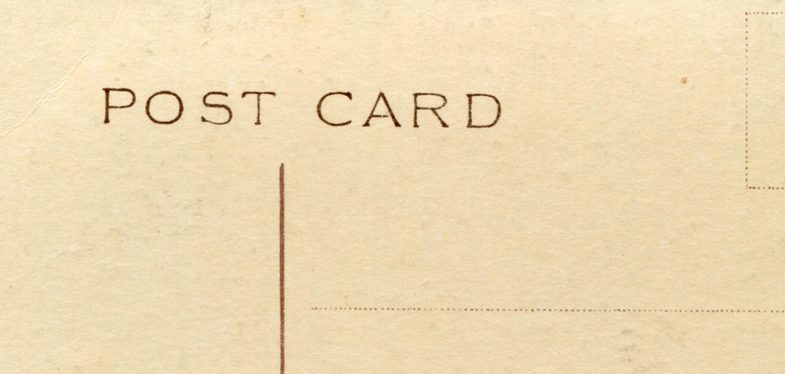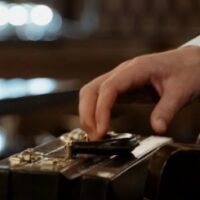The street is lined with high-cut elms which provide shade for the children who play along it. They’re also a boon to Jerry who, on sunny days like today, in his dark blue uniform, enjoys the cool they offer. Gazing down the street, with its family homes and wide sidewalks, he smiles. He smiles because no one here has ever received the Postcard.
Jerry has been working as a postman for 32 years and still walks his route despite all of the technological changes that have occurred in those decades. But no matter how advanced or smart the world may think it is, he never tells anyone about the Postcard. He knows the world still has things in it that can’t be explained.
The first one he delivered was in March of 1982, a cold day of a winter that wouldn’t let go and, as bundled up as he was, he almost missed it. He only grunted into the frigid air when he pulled the Postcard out, not remembering putting it into his mailbag. He flipped it over a few times, checking the address to make sure he hadn’t grabbed it by mistake, but he knew the place, even if the card didn’t have a name on it. To this day he can’t remember too much of its appearance, or any of its successors. Their roughly promotional semblance of each Postcard flickers in and out of his memory like the image on an old television.
Jerry does remember the first Postcard caused him to pause too long in the cold, holding it with an unmistakeable sense of trepidation, trying to make sense of its copy until his fingers ran cold. Time and duty coerced him to shake this loose, though, and he commanded his legs to keep moving, telling himself it was just an advertisement of some kind.
Perhaps because of his apprehension, perhaps because the address on the Postcard belonged to a little old lady whom he knew to be a widow, he knocked on the door to deliver it and the rest of her mail. Despite the cold she answered the door, wrapped deeply in a shawl, the house behind her filled with shadows and dust. She smiled warmly, that alone making it worth the stop to Jerry, but the conversation saddened him. It revealed the usual facts of her life: her joints ached; the limited mobility made it hard to meet new people; her children rarely came around.
Taking the card, though, she brightened and said, “It looks like I’ve won a contest. Three wishes? What a lark!” She laughed and Jerry blinked. He hadn’t read that in the Postcard’s content, or much of anything, but said nothing, not wanting to disrupt the widow’s brief moment of happiness.
She had remained part of his route for several months afterward, though she rarely had time to talk to Jerry after that; she had started to go out much more, and he noticed her children came around often, bringing spouses and families. He had always meant to ask her about the Postcard, but before he could he heard she had died, peacefully, on her couch, watching a British baking show and, as legend had it, with a smile on her face.
Witnessing the brief upturn in her fortune was enough for Jerry, though, and he didn’t think anymore about the Postcard until it appeared in his hand again a few years later. This time he was walking in a different neighborhood, newer than the widow’s, but one hit hard by the savings and loan crisis.
Again with its flickering facade in hand, Jerry felt obliged to walk past the car on the front lawn with grass growing up around it. He knocked on the front door to deliver it. The door opened and was answered by a man who had the fetid smell of someone who hadn’t left the house in sometime, a 5-day beard, and a shirt that could have used changing.
Like with the old woman, though, the man accepted the Postcard, read the unreadable contents and whooped with happiness. Jerry tried to ask him what it was, but he slammed the door in his face and retreated into his house.
Coming around again on his route month-after-month, Jerry caught glimpses of a parade of good-looking women coming and going. He never spoke to any of them, though, and he never got the chance to ask the resident again. The worn car on the front lawn was replaced with a Porsche in the driveway, and when that disappeared the house began to fall into disrepair.
A few years later Jerry did notice the older, less pretentious car returned to the driveway, perhaps a bit worse for wear. Jerry shrugged and approached the mail slot by the front door, only stopping when it opened and the old occupant stepped out. He appeared much the same except for newer clothing, but Jerry hadn’t paid too much attention to details because of the pistol the man held.
The man screamed something about ‘parasites’ and ‘bill collectors’, waved the gun and shouted about conspirators ruining him. He was yelling something about a brother when he drowned out his own words by firing the gun into the air.
Jerry didn’t wait to see if he was going to shoot the next bullet at him. He ran and called the police a few houses away. He heard later the man was arrested and spent time in jail before hanging himself.
It’s gone on like that ever since. The Postcard appears in Jerry’s hand and, as is his duty, he delivers it, and the recipients life changes. Some individuals disappeared from his route, so Jerry is never certain what becomes of them, but the ones that remain give him reason to be pessimistic. He recalls the boy with down syndrome who, overnight, became incredibly intelligent, only to realize the neighborhood children who he had greeted with smiles had been ridiculing him all along. He remembers the smiling plain girl, who stepped out of her door a ravaging beauty, only to retreat into a shell of cynicism and shame.
After all of these years, there had only been a few whom the Postcard had seem to make happy. And the first one was dead.
Now, today, Jerry has a new Postcard to deliver. It takes him to a lovely bungalow, new enough to be the home of young, successful suburbanites, but with a lawn in need of mowing and gutters filled with leaves. He examines the home’s off-white color and empty driveway, takes a deep breath and proceeds up the walk. He stops again at the door, considers putting the Postcard in the mail slot, but his empty hand curls into a fist and he knocks.
The door is answered by a comely young woman with dark curly hair, a smile on her face but her eyes ringed with fatigue. She carries a fussy young baby, adorable but unmanageable, a tiny grub of noise and movement in her arms. Despite the house’s size, Jerry can’t hear anyone else within.
There is a plain and evident relief in her expression at greeting a fellow adult at her door, a smile blooming on her face even as he struggles with the child. Despite himself, Jerry returns her smile.
“Congratulations,” he tells her, handing her the Postcard.
See the author’s published work here.
Related Posts
The American: Chapter 45 Next Post:
The Night Plague
























